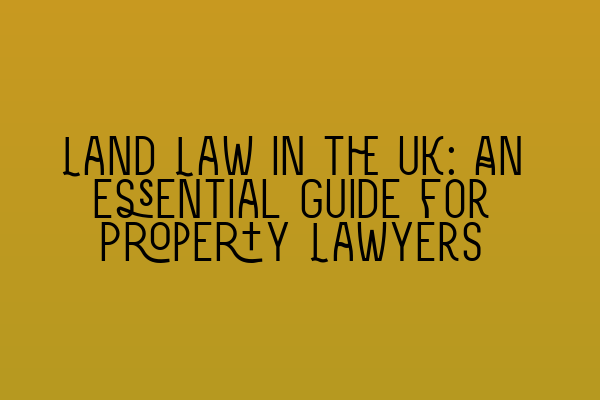Land Law in the UK: An Essential Guide for Property Lawyers
Introduction
As a property lawyer, understanding land law in the UK is crucial for providing effective legal advice and services to clients. Whether you are a solicitor preparing for the Solicitors Qualifying Examination (SQE) or a practicing lawyer looking to brush up on your knowledge, this guide will provide you with a comprehensive overview of land law in the UK.
1. Legal Framework: Understanding the Basics
Land law in the UK is primarily governed by statutes, common law, and equity. The key legislation that property lawyers need to be familiar with includes the Law of Property Act 1925, Land Registration Act 2002, and the Landlord and Tenant Act 1954. These laws form the foundation of property transactions, ownership rights, and lease agreements.
2. Freehold and Leasehold Estates
When dealing with land, it is essential to understand the difference between freehold and leasehold estates. Freehold estates grant the owner full ownership rights over the land, while leasehold estates involve a lease agreement between the owner (landlord) and the occupier (tenant) for a specific period. Understanding the rights and obligations associated with each type of estate is crucial for property lawyers.
3. Transfer of Title: Conveyancing
Conveyancing is a fundamental aspect of land law in the UK. This process involves the transfer of ownership from one party to another. Property lawyers play a crucial role in ensuring that all legal requirements, such as land registry searches, drafting contracts, and completing necessary paperwork, are fulfilled to protect their clients’ interests. Knowledge of conveyancing procedures is essential for smooth property transactions.
4. Land Registration
The Land Registration Act 2002 introduced a system of registered land in the UK, replacing the old system of unregistered land. Property lawyers must understand the land registration process, including the importance of registering title deeds, conducting searches, and dealing with adverse possession claims. Registering land provides certainty of ownership and reduces the risk of hidden interests or disputes.
5. Easements and Covenants
Easements and covenants are legal rights and obligations that may affect landownership. Easements grant someone the right to use another person’s land for a specific purpose, such as a right of way or access for utilities. Covenants, on the other hand, are legally binding obligations that restrict or require certain actions by the landowner. Property lawyers must be familiar with the creation, enforcement, and potential limitations surrounding easements and covenants.
6. Leasehold Matters
Leasehold matters often form a significant part of property law practice. Property lawyers need to understand the complexities of lease agreements, including the terms and conditions, rent reviews, service charges, and lease extensions. Awareness of the Landlord and Tenant Act 1954, which provides rights and protection for commercial tenants, is essential for advising clients on leasehold matters.
7. Dispute Resolution
Disputes relating to land can arise in various forms, including boundary disputes, rights of way, and breach of lease agreements. Property lawyers play a critical role in dispute resolution, which may involve negotiation, mediation, or litigation. Understanding the relevant laws, case precedents, and dispute resolution procedures is vital for successfully representing clients in land-related disputes.
Conclusion
As a property lawyer, having a solid understanding of land law in the UK is essential for providing excellent legal services to clients. This guide has introduced the basics of land law, including freehold and leasehold estates, conveyancing, land registration, easements and covenants, leasehold matters, and dispute resolution. By continuously expanding your knowledge and staying updated on changes in legislation and case law, you can enhance your expertise in this field.
To further develop your understanding and prepare for the SQE exam, make sure to check out our related articles:
– SQE 1 Practice Exam Questions
– SQE 1 Practice Mocks FLK1 FLK2
– SQE 2 Preparation Courses
– SQE 1 Preparation Courses
– SRA SQE Exam Dates
At SQE Property Law & Land Law, we are here to support your legal career journey. Stay tuned for more informative articles and resources to enhance your knowledge and excel in the field of property law.
